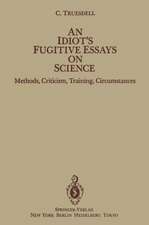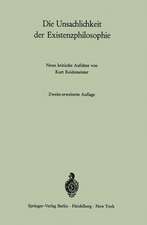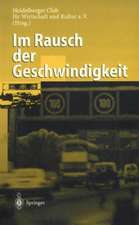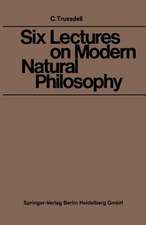What Does it Mean to be an Empiricist?: Empiricisms in Eighteenth Century Sciences: Boston Studies in the Philosophy and History of Science, cartea 331
Editat de Siegfried Bodenmann, Anne-Lise Reyen Limba Engleză Hardback – 22 iun 2018
Our answer focuses on the practices established by representative scholars. This approach allows us to demonstrate two things. First, that empiricism is not a monolith but exists in a plurality of forms. Today’s understanding of the empirical sciences was gradually shaped by the exchanges among scholars combining different traditions, world views and experimental settings. Second, the long proclaimed antagonism between empiricism and rationalism is not the whole story. Our case studies show that a very fruitful exchange between both systems of thought occurred. It is a story of integration, appropriation and transformation more than one of mere opposition. We asked twelve authors to explore these fascinating new facets of empiricisms. The plurality of their voices mirrors the multiple faces of the concept itself. Every contribution can be understood as a piece of a much larger puzzle. Together, they help us better understand the emergence of empiricism and the inventiveness of the scientific enterprise.
| Toate formatele și edițiile | Preț | Express |
|---|---|---|
| Paperback (1) | 781.77 lei 6-8 săpt. | |
| Springer International Publishing – 8 ian 2019 | 781.77 lei 6-8 săpt. | |
| Hardback (1) | 788.41 lei 6-8 săpt. | |
| Springer International Publishing – 22 iun 2018 | 788.41 lei 6-8 săpt. |
Din seria Boston Studies in the Philosophy and History of Science
- 18%
 Preț: 944.19 lei
Preț: 944.19 lei - 15%
 Preț: 646.75 lei
Preț: 646.75 lei - 15%
 Preț: 646.75 lei
Preț: 646.75 lei - 15%
 Preț: 699.28 lei
Preț: 699.28 lei - 18%
 Preț: 736.50 lei
Preț: 736.50 lei - 18%
 Preț: 706.87 lei
Preț: 706.87 lei - 15%
 Preț: 643.16 lei
Preț: 643.16 lei - 15%
 Preț: 650.69 lei
Preț: 650.69 lei - 15%
 Preț: 634.18 lei
Preț: 634.18 lei - 15%
 Preț: 642.68 lei
Preț: 642.68 lei -
 Preț: 391.40 lei
Preț: 391.40 lei -
 Preț: 383.33 lei
Preț: 383.33 lei - 18%
 Preț: 944.19 lei
Preț: 944.19 lei - 18%
 Preț: 955.56 lei
Preț: 955.56 lei - 15%
 Preț: 643.65 lei
Preț: 643.65 lei -
 Preț: 392.75 lei
Preț: 392.75 lei - 18%
 Preț: 1229.10 lei
Preț: 1229.10 lei - 18%
 Preț: 1238.23 lei
Preț: 1238.23 lei - 18%
 Preț: 951.29 lei
Preț: 951.29 lei - 18%
 Preț: 1223.25 lei
Preț: 1223.25 lei - 18%
 Preț: 1225.79 lei
Preț: 1225.79 lei - 18%
 Preț: 1226.42 lei
Preț: 1226.42 lei - 18%
 Preț: 1236.82 lei
Preț: 1236.82 lei - 15%
 Preț: 644.49 lei
Preț: 644.49 lei - 18%
 Preț: 1231.78 lei
Preț: 1231.78 lei - 15%
 Preț: 644.30 lei
Preț: 644.30 lei - 18%
 Preț: 957.62 lei
Preț: 957.62 lei - 18%
 Preț: 1222.49 lei
Preț: 1222.49 lei - 18%
 Preț: 947.50 lei
Preț: 947.50 lei - 18%
 Preț: 1833.95 lei
Preț: 1833.95 lei - 18%
 Preț: 1227.99 lei
Preț: 1227.99 lei - 18%
 Preț: 947.35 lei
Preț: 947.35 lei
Preț: 788.41 lei
Preț vechi: 961.47 lei
-18% Nou
Puncte Express: 1183
Preț estimativ în valută:
150.88€ • 157.32$ • 125.40£
150.88€ • 157.32$ • 125.40£
Carte tipărită la comandă
Livrare economică 21 martie-04 aprilie
Preluare comenzi: 021 569.72.76
Specificații
ISBN-13: 9783319698588
ISBN-10: 3319698583
Pagini: 308
Ilustrații: IX, 297 p. 7 illus.
Dimensiuni: 155 x 235 mm
Greutate: 0.63 kg
Ediția:1st ed. 2018
Editura: Springer International Publishing
Colecția Springer
Seria Boston Studies in the Philosophy and History of Science
Locul publicării:Cham, Switzerland
ISBN-10: 3319698583
Pagini: 308
Ilustrații: IX, 297 p. 7 illus.
Dimensiuni: 155 x 235 mm
Greutate: 0.63 kg
Ediția:1st ed. 2018
Editura: Springer International Publishing
Colecția Springer
Seria Boston Studies in the Philosophy and History of Science
Locul publicării:Cham, Switzerland
Cuprins
Introduction (Siegfried BODENMANN & Anne-Lise REY).- Part I. The Plurality of Empiricisms.- Chapter 1. Four Methods of Empirical Inquiry in the Aftermath of Newton’s Challenge (Eric SCHLIESSER).- Chapter 2. Fictitious Empiricism, Material Experiments (Marc RATCLIFF).- Part II. Newtonianism and non-Newtonianism empiricisms.- Chapter 3. Experimentum crucis. Newton’s Empiricism at the Crossroads (Philippe HAMOU).- Chapter 4. (The Experiments of Willem Jacob ’s Gravesande (Anne-Lise REY).- Chapter 5. Empiricism as a Rhetoric of Legitimation (Siegfried BODENMANN).- Part III. Empiricism and Rationality.- Chapter 6. Philosophical and Scientific Empiricism in the 18th Century (Catherine WILSON).- Chapter 7. Buffon’s Natural History (Thierry HOQUET).- Chapter 8. What does it mean to be an Empiricist in Medicine? Baglivi’s De praxi medica (1696) (Raphaële ANDRAULT).- Chapter 9. Empiricism and Certainty in Science (André CHARRAK).- Part IV. Reevaluation of the Label ‘Empiricism’.- Chapter 10. WasEarly Eighteenth-Century Chemistry an Empirical Science? (Bernard JOLY).- Chapter 11. Conducting Observations and Tests (Christian LEDUC).- Chapter 12. From Locke to Materialism (Charles T. WOLFE).
Notă biografică
Siegfried Bodenmann teaches early modern history at the University of Zurich. He was trained as an historian and philosopher, with emphasis on the history of science and knowledge. He is currently researching the forms and rhetorical styles of scholarly communication in the eighteenth century. He has published several articles on the subject in the Revue d’Histoire des Sciences and in Dix-Huitième Siècle, but also, for a broader audience, in Physics Today. Other publications investigate the emergence of a scientific identity like his miscellany on myths, heroes, and symbols in the history of science. He is one of the scientific editors of the correspondence of the eighteenth-century mathematician Leonhard Euler. He has been an advisory board member of the Swiss Society for the History of Medicine and Sciences and the 2006 prize winner of the Deutsche Gesellschaft für Geschichte der Medizin, Naturwissenschaften und Technik (DGGMNT) among other memberships and distinctions.
Anne-Lise Rey, agrégée in Philosophy, is associate professor of history and philosophy of science at the University of Lille I. In 2003, she defended her thesis on Leibniz’s dynamics at the Sorbonne, Paris, under the direction of Michel Fichant. She defended her habilitation thesis on the epistemological practices and natural philosophy un the eighteenth century, supervised by P.-F. Moreau, at the Lyon ENS in 2013. She has published numerous articles on the relations between science and philosophy in Leibniz and on eighteenth century natural philosophy. She has also edited a collective work entitled Méthode et Histoire, dealing with methods in history and philosophy of science. She was a member of the School of Historical Studies at the Institute for Advanced Study (Princeton) in 2012-2013. In 2016, she published a French translation of the correspondence between Leibniz and De Volder, including an extended introduction on the notion of action in Leibniz’s dynamical thought.
Anne-Lise Rey, agrégée in Philosophy, is associate professor of history and philosophy of science at the University of Lille I. In 2003, she defended her thesis on Leibniz’s dynamics at the Sorbonne, Paris, under the direction of Michel Fichant. She defended her habilitation thesis on the epistemological practices and natural philosophy un the eighteenth century, supervised by P.-F. Moreau, at the Lyon ENS in 2013. She has published numerous articles on the relations between science and philosophy in Leibniz and on eighteenth century natural philosophy. She has also edited a collective work entitled Méthode et Histoire, dealing with methods in history and philosophy of science. She was a member of the School of Historical Studies at the Institute for Advanced Study (Princeton) in 2012-2013. In 2016, she published a French translation of the correspondence between Leibniz and De Volder, including an extended introduction on the notion of action in Leibniz’s dynamical thought.
Textul de pe ultima copertă
This book begins with an observation: At the time when empiricism arose and slowly established itself, the word itself had not yet been coined. Hence the central question of this volume: What does it mean to conduct empirical science in early modern Europe? How can we catch the elusive figure of the empiricist?
Our answer focuses on the practices established by representative scholars. This approach allows us to demonstrate two things. First, that empiricism is not a monolith but exists in a plurality of forms. Today’s understanding of the empirical sciences was gradually shaped by the exchanges among scholars combining different traditions, world views and experimental settings. Second, the long proclaimed antagonism between empiricism and rationalism is not the whole story. Our case studies show that a very fruitful exchange between both systems of thought occurred. It is a story of integration, appropriation and transformation more than one of mere opposition. We asked twelve authors to explore these fascinating new facets of empiricisms. The plurality of their voices mirrors the multiple faces of the concept itself. Every contribution can be understood as a piece of a much larger puzzle. Together, they help us better understand the emergence of empiricism and the inventiveness of the scientific enterprise.
Our answer focuses on the practices established by representative scholars. This approach allows us to demonstrate two things. First, that empiricism is not a monolith but exists in a plurality of forms. Today’s understanding of the empirical sciences was gradually shaped by the exchanges among scholars combining different traditions, world views and experimental settings. Second, the long proclaimed antagonism between empiricism and rationalism is not the whole story. Our case studies show that a very fruitful exchange between both systems of thought occurred. It is a story of integration, appropriation and transformation more than one of mere opposition. We asked twelve authors to explore these fascinating new facets of empiricisms. The plurality of their voices mirrors the multiple faces of the concept itself. Every contribution can be understood as a piece of a much larger puzzle. Together, they help us better understand the emergence of empiricism and the inventiveness of the scientific enterprise.
Caracteristici
Inventive papers which shed new light on 18th Century empiricism as a constitutive moment of European science Constructive dialog between experienced scholars and up-and-coming researchers? An international collection of authors























